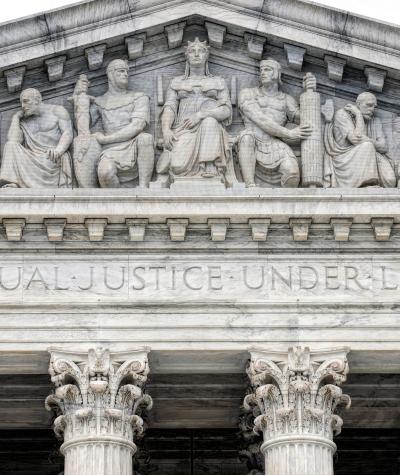The Supreme Court of the United States has released its final investigation report of last year’s leak of the Dobbs. v. Jackson Women’s Health Organization decision. This monumental breach of the Court’s confidentiality was handled with a conspicuously flawed investigation that yielded—surprise!—an inconclusive result. With this first major public act of the year, the Court teased the next installment of the biggest showdown of the term: Supreme Court v. Ethics.
It of course makes sense that the investigation into the leaked opinion came up short. The Court doesn’t have an office responsible for conducting ethics investigations of this nature, so the Marshal of the Supreme Court was directed to do the work even though investigations are not in the statutory job description. The final report boasts of formal interviews of 97 witnesses who signed sworn affidavits, but the justices who wrote the leaked opinion were not among them. The Marshal responded to criticism of omitting justices from the investigation by saying she “spoke” with them.
Even standing alone, the failure to follow standard investigation practices of interviewing all relevant witnesses would demonstrate a critical lack of seriousness regarding ethics issues. But this investigation does not stand alone. It is simply the most recent development in the Court's epic battle to shield itself from any accountability.
The chief justice’s year-end report on the federal judiciary published on December 31, 2022, made clear the Court has no interest in addressing its overwhelming ethics issues. His report does not mention ethics a single time – despite the constant media coverage of the ethical conduct of the justices.
Headlines throughout last year included allegations of violations of recusal requirements, breaches of confidentiality, and improper influence by special interests. There were also two congressional hearings about Supreme Court ethics. The chief justice’s decision to ignore ethics at the Court contrasts with his report one year earlier where he discussed at length ethics reform for lower federal court judges in response to one newspaper’s allegations of conflicts of interests.
Another clear signal that the Court lacks any genuine concern about ethics compliance was its response to the highly publicized allegations of Justice Alito leaking the outcome of a 2014 decision. The Court’s legal counsel sent a two-paragraph letter to Congress on November 28, 2022, concluding that there was no evidence to support the allegations. But Justice Alito and other witnesses were never questioned by the Court. Instead, the counsel apparently relied on public statements in the media to make his legal conclusion.
It should be painfully obvious to the public: this is a Court barely going through the motions to even pretend that it cares about ethics.
Sadly, the lack of transparency and accountability does not end with leaked decisions and vague public remarks. News reports at the end of 2022 brought the Supreme Court Historical Society out of the shadows—even though its donors remain there. The organization, which is closely tied to the Court, is facing allegations that secretive donors, like corporations and other private special interests, can use donations to influence justices on matters before the Court.
In 2023, leaked decisions, conflicts of interests, and secretive nonprofits could be only the tip of the iceberg for the Court’s ethics woes. The ethics problem is straightforward. The Court needs mandatory ethics rules and a formal, internal fact finder responsible for compliance with the rules. This is the bare minimum required to put the Court on par with both chambers of Congress, every agency in the executive branch, and the lower federal courts.
Clear recusal standards with an independent compliance mechanism would have governed whether Justice Thomas should have recused in matters related to January 6th and the outrage may have been mitigated if an independent review board said his participation didn’t raise any conflicts concerns. A code of conduct would have governed justices’ and staff behavior surrounding pending opinions, possibly preventing a leak that threw an unprepared public into panic.
One of the biggest missed layups in the ethics world was the failure of the Supreme Court to make any ethics reforms whatsoever—or even acknowledge that ethics problems exist—despite a year of ethics-related scandals at the nation’s highest court.
The Court now has a golden opportunity to reassure the public that it understands a fundamental truth: that public trust is a bedrock upon which all our democratic institutions rely–including the Supreme Court. Hopefully, 2023 will be a banner year for ethics in the federal government, and it could all start with the Supreme Court.


